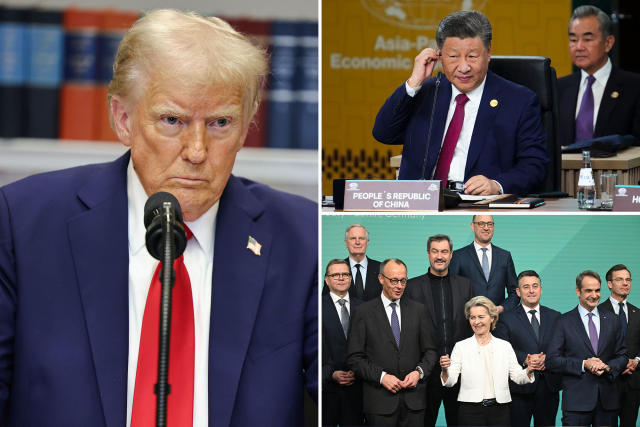
Trump threatens China and the EU with more tariffs
Because fentanyl is being transported from China to the United States through Mexico and Canada, U.S. President Donald Trump on Tuesday threatened to impose tariffs on the European Union and stated that his government was considering imposing a 10% punitive levy on Chinese goods.
Trump voiced his latest tariff threats in remarks to reporters at the White House a day after taking office without immediately imposing tariffs as he had promised during his campaign.
Financial markets and trade groups breathed temporarily on Tuesday, but his newest statements emphasized Trump’s ongoing goal for larger levies and a new Feb. 1 deadline for 25% tariffs against Canada and Mexico, as well as duties on China and the EU.
Trump said the EU and other countries also had troubling trade surpluses with the United States.
Reiterating remarks from Monday, he said, “The European Union is very, very bad to us,” “So they’re going to be in for tariffs. It’s the only way … you’re going to get fairness.”
Trump stated on Monday that unless Canada and Mexico crack down on the flow of illegal migrants and fentanyl, including precursor chemicals from China, across their borders, he was thinking of levying the duties on them.
Trump had previously threatened a 10% duty on Chinese imports because of the trade but realigned that with the Feb. 1 deadline.
China said it was eager to maintain discussion with the U.S. to “properly handle differences and expand mutually beneficial cooperation”. It sought to promote stable and sustainable ties with the U.S., the foreign ministry said.
“We always believe that there is no winner in a trade war or tariff war. China will always firmly safeguard its national interests,” ministry spokesperson Mao Ning told reporters at a regular press briefing on Wednesday.
Early on Tuesday, White House trade adviser Peter Navarro told CNBC that Trump’s threat of tariffs on Canada and Mexico was intended to put pressure on the two nations to prevent the entry of illegal immigrants and drugs into the United States.
“The reason why he’s considering 25, 25 and 10 (percent), or whatever it’s going to be, on Canada, Mexico and China, is because 300 Americans die every day” from fentanyl overdoses, Navarro said.
Trump on Monday announced a sweeping immigration crackdown, including a broad ban on asylum.
APRIL 1 REPORTS
Trump opened a new tab and signed a wide trade memorandum Monday, directing federal agencies to do thorough analyses of various trade-related concerns by April 1.
These include evaluations of ongoing trade deficits in the United States, unfair trade practices, and currency manipulation by China and other partner nations. A “global supplemental tariff” and modifications to the $800 de minimis duty-free exemption for low-value cargoes frequently accused of illegally importing fentanyl precursor chemicals were among the measures suggested in Trump’s order.
The mandated reviews give Trump’s cabinet candidates some leeway to work out their alleged differences over how to implement his pledges of universal tariffs and up to 60% duties on Chinese goods.
Although Trump’s latest attack on China and the European Union may reverse that momentum, his more cautious approach to tariffs sparked a surge in U.S. equities that sent the benchmark S&P 500 index (.SPX) to its highest level in a month.
Trump likely “decided to go a little slower and also to make sure he has as firm a legal foundation as he can get for these kinds of actions,” said William Reinsch, a trade expert at the Center for Strategic and International Studies in Washington. “He’s figuring out how to best use his leverage to get what he wants.”
COLDER TONES
Trump’s deadline of February 1 was met with accommodative responses from Mexico and Canada. Claudia Sheinbaum, the president of Mexico, stated that she would address U.S. activities “step by step” and stress Mexico’s independence and sovereignty.
But she added that the U.S.-Mexico-Canada free trade agreement was not up for renegotiation until 2026, a comment aimed at pre-empting suggestions that Trump will seek an early revamp of the pact that underpins more than $1.8 trillion in annual three-way trade.
maize producers are anxious about U.S. tariffs and retaliatory penalties hurting commerce with Mexico, their major export client for maize, and with Canada, the top export consumer for U.S. corn-derived ethanol.
Regarding Trump, Illinois farmer Kenny Hartman Jr., board president of the National Corn Growers Association, stated, “We understand that he is a negotiating type of person.” “We’re just hoping that we can come out of this where we don’t lose the exports – we don’t lose that corn going to Mexico or that ethanol going to Canada.”
All Categories
Recent Posts
Tags
+13162306000
zoneyetu@yahoo.com



